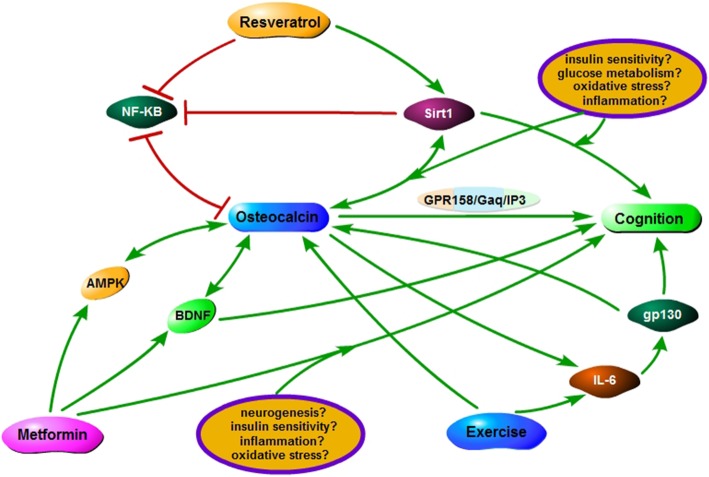Fig. 2.
The possible therapeutic implications of resveratrol/metformin/exercise in cognition through osteocalcin signalling. Resveratrol, metformin and exercise have all been reported to have benefical effects on cognition improvements, which might have a link with their regulation on osteocalcin (OCN) from our point of view. Briefly, resveratrol on one hand can induce the expression of OCN, which has been found to improve age-related cognitive decline via the GRP158/Gad/IP3 pathway, in human bone marrow mesenchymal stem cells, murine MC3T3 and ST2 cell lines by decreasing nuclear translocation of the NF-κB; on the other hand, several common pathways of SIRT1 activated by resveratrol on the regulation of OCN and cognition, such as improved insulin sensititvity, improved glucose metabolism, reduced oxidative stress and inflammation through the suppression of NF-κB, give rise to the possible link between resveratrol/SIRT1 and OCN. Metformin could attenuate bone loss and increase bone regeneration capability through increased expression of OCN, via a mechanism related to AMPK, and regulate behaviours through upregulation of BDNF, which is related to the beneficial actions of OCN in age-related memory loss. These findings suggest a putative link between metformin therapy and brain functions wherein OCN may act as a facilitator of the improved cognitive functions by metformin through improvement of neurotrophic signaling and energy metabolism, and through modulation of inflammatory reactions. An exercise-induced activation of the IL-6/OCN/gp130 axis that in turn improves energy homeostasis and thereby improves cognition could be another plausible explanation of why interventional strategies such as exercise can improve cognitive ability.

